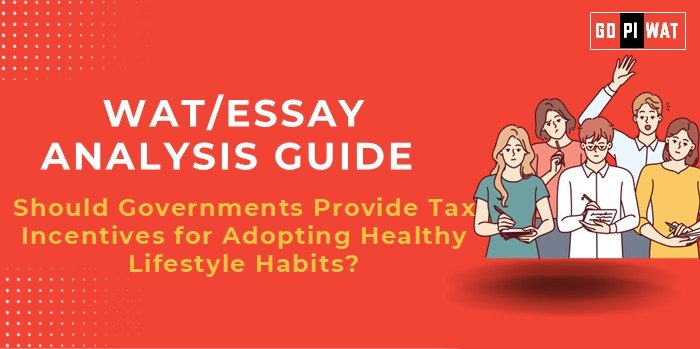📋 Written Ability Test (WAT)/Essay Analysis Guide
🌟 Topic: Should Governments Provide Tax Incentives for Adopting Healthy Lifestyle Habits?
🌐 Understanding the Topic’s Importance
Tax incentives for health tie closely to public policy, economics, and social equity, making this a compelling topic for B-school essays. It explores the intersection of financial levers and societal well-being.
📝 Effective Planning and Writing
- Time Allocation:
- Planning: 5 minutes
- Writing: 20 minutes
- Review: 5 minutes
- Preparation Tips:
- Research examples (e.g., Singapore, Japan).
- Use recent data for credibility.
🎯 Introduction Techniques
- Contrast Approach: “While healthcare costs soar globally, preventive measures like incentivizing healthy lifestyles could reduce this burden. However, implementation requires nuanced policy design.”
- Timeline Approach: “From Japan’s ‘Metabo Law’ to Singapore’s fitness tax credits, governments worldwide are experimenting with fiscal tools to promote health, with varying success.”
📊 Structuring the Essay Body
Achievements:
- Example: Singapore’s tax incentives reduced obesity by 15%.
- Data: $6 saved for every $1 in preventive care investment.
Challenges:
- Equity: Disparity in who benefits.
- Misuse: Fraudulent claims in U.S. programs.
Future Outlook:
- Recommendations: Subsidizing healthy food or implementing scalable digital tracking systems.
- Vision: Achieving universal health equity through targeted fiscal policies.
📄 Concluding Effectively
- Balanced Perspective: “Tax incentives offer promise in tackling lifestyle diseases, but their success depends on equitable implementation and robust monitoring frameworks.”
- Global Comparison: “Adopting lessons from Singapore and Japan could help countries design more effective and inclusive health policies.”
🔍 Analyzing Successes and Shortcomings
- Successes: Reduced healthcare costs, public health improvements.
- Shortcomings: Inequitable benefits, policy complexity.
- Global Context: Learning from countries with mature systems like Sweden.
🌱 Recommendations for Sustainable Progress
- Introduce tiered benefits targeting lower-income groups.
- Integrate technology for monitoring and rewarding health behaviors.
- Foster public-private partnerships to amplify impact.
✍️ Sample Short Essays
- Balanced Perspective: “Governments must find ways to balance cost savings with equitable access to ensure all citizens benefit from healthy lifestyle incentives.”
- Solution-Oriented: “Tax credits for healthy habits can reduce healthcare burdens, provided they are backed by strong enforcement mechanisms.”
- Global Comparison: “Drawing lessons from Singapore’s successes and the U.S.’s struggles, effective tax incentives require simplicity, equity, and comprehensive monitoring.”


